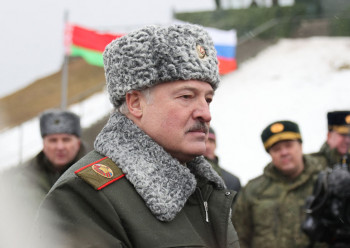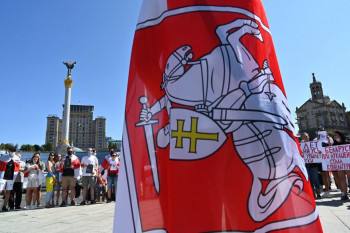2 years after dictator Lukashenko stole the election, Belarus is a grim place
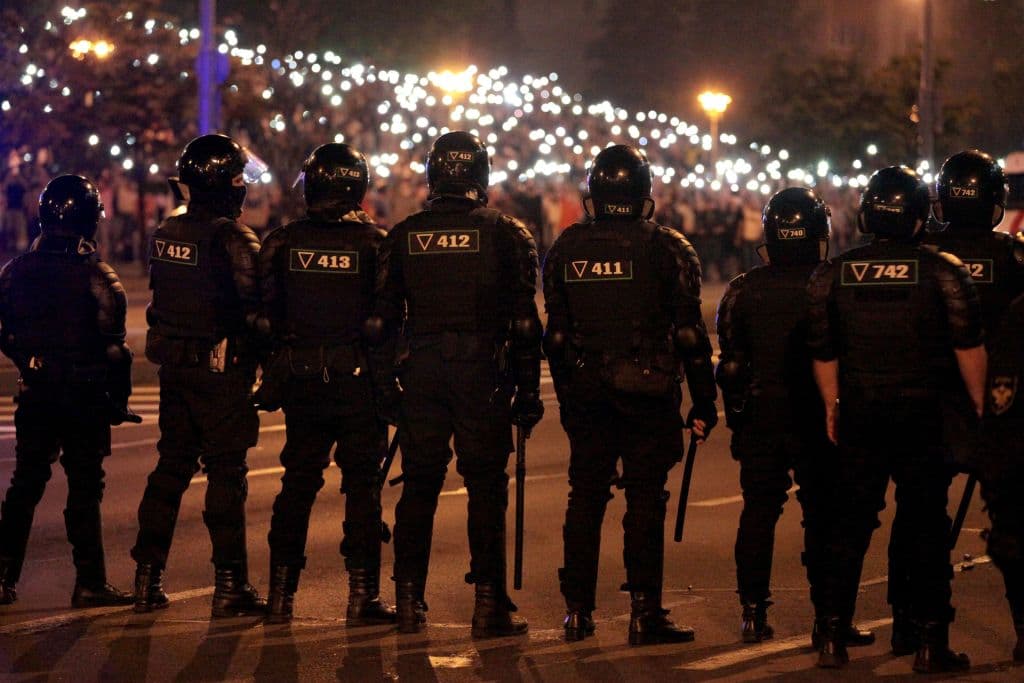
Aug. 9 marks the second anniversary of the day when Belarusians had the chance to break free from decades of despotic rule.
This date also marks the day when Belarusian dictator Alexander Lukashenko declared himself president for his sixth consecutive term in an election internationally deemed as neither free nor fair.
Lukashenko proceeded to brutally crush the nation’s attempt at popular upheaval, turning Belarus into a very grim place.
The 2020 presidential election rendered over 1,000 Belarusians, including many top-level opposition members, as political prisoners, according to international human rights groups, as thousands were forced into exile by Lukashenko’s regime.
Two years later, Lukashenko has transformed Belarus into a tool to enable Russia’s all-out war against Ukraine, which has already killed tens of thousands of people.
The Kyiv Independent recalls the events that followed Belarus’ 2020 presidential election, including intensified state-led repressions, attacks on Belarusian national identity, and a decisive end to the country's political and economic independence.
Aug. 9, 2020
Elections in Belarus run like clockwork: Lukashenko runs against candidates approved by his regime, high-profile opposition leaders are forbidden from participating, and Lukashenko is soon declared victorious with over 80% of the vote.
The presidential election in 2020 was different. After 26 years of unopposed rule, the Belarusian people had had enough.
After Lukashenko’s regime failed to adequately respond to the Covid-19 pandemic and the burgeoning economic downturn that followed, several well-known Belarusians declared their intention to run in the upcoming elections – thousands showed up to support them.
The top three candidates running against Lukashenko were Belarusian opposition blogger Siarhei Tsikhanouski, former official Valeryi Tsapkala, and Russian-controlled Belgazprombank head Viktar Babaryka.
While at first only Tsikhanouskiy openly opposed Lukashenko, having been recognized for publishing videos criticizing the regime, all three were banned from participating in the election.
Tsikhanouskiy was detained before the election and later sentenced to 18 years in prison. Babaryka and his son Eduard were also detained – Viktar was sentenced to 14 years in prison, while Eduard has been detained for over two years without charges. Tsapkala was forced into exile.
Following popular upheaval following the top candidates’ detainment, Lukashenko’s regime permitted Tsikhanouskiy’s wife, Sviatlana, to run in the election.
Sviatlana Tsikhanouskaya, who registered as a candidate following her husband’s detainment, was backed by all three of the former candidates’ campaigns.
Days before the election, a rally in support of Tsikhanouskaya gathered over 60,000 people and, on the day of the election itself, tens of thousands took to the street in anticipation of her win.
However, local polling stations refused to share the results of the election, despite the legal requirement to do so. State-run exit polls proclaimed a high likelihood for another “confident win for Lukashenko.”
The regime turned off the internet in the country – Belarus went offline.
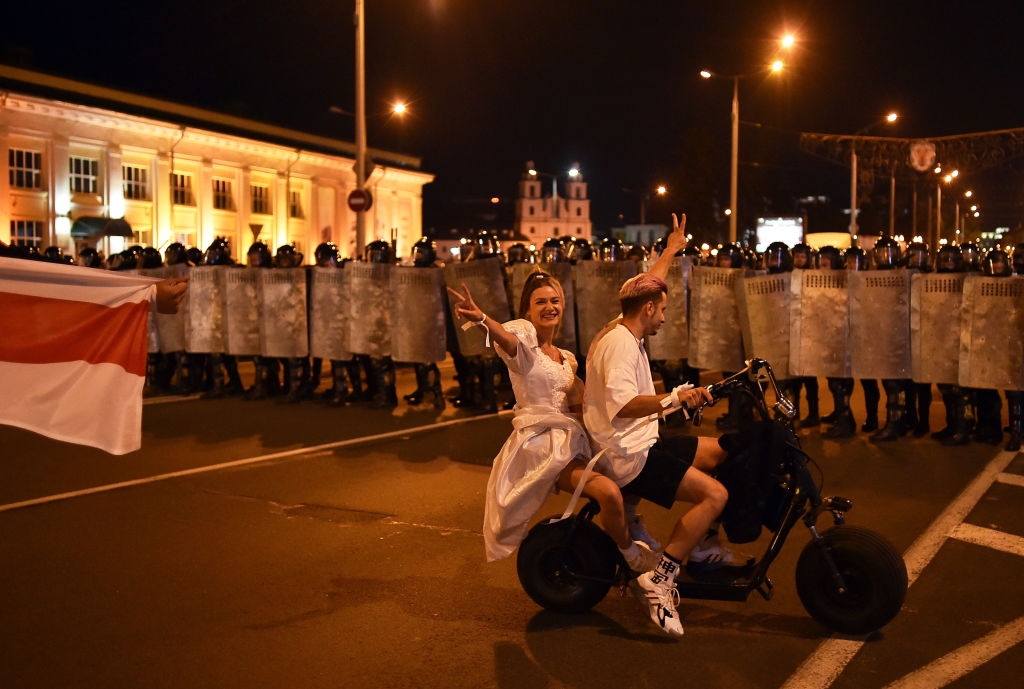
A couple rides a scooter in front of the riot police during a protest of opposition supporters triggered by election fraud, in Minsk, on Aug. 9, 2020. (SERGEI GAPON/AFP via Getty Images)
What followed was the largest protest in Belarus’ history, with unofficial reports noting that around 200,000 people took to the streets in Minsk to demand free and fair elections.
Lukashenko’s regime cracked down hard.
At least four people were killed and over 13,500 people, including 700 minors, were arrested in the first weeks of the protests, according to a UN report. Many of those detained were tortured and Minsk’s Okrestina prison became widely considered a torture chamber.
Ongoing repressions
As 2020 passed, state-led repressions did not, as Lukashenko’s regime continued to persecute political opposition members, those who expressed anti-regime views, or even those suspected of being friendly toward political opposition.
Over 31,000 people were detained on political grounds, many of whom underwent some form of torture, reports Belarusian human rights watchdog Viasna.
Viasna considers 1,262 detainees to be political prisoners, although experts believe that the actual number is significantly higher as many want to avoid the complications involved with such a status.
There are also reportedly 5,500 ongoing politically motivated cases in Belarus.
Many reports indicate that political prisoners have been denied the right to correspondence, are given marks on their prison robes to signify that they are “leaning toward extremism,” and have been forced to live in solitary confinement.
At least one political prisoner has died while in custody. The death of Vitold Ashurak was not investigated by Belarusian authorities.
The number of people deemed political prisoners is growing gradually. In July 2022 alone, 61 names were added to the list.
Of those charged with “extremism,” some were even found guilty for having subscribed to or reposted content by pro-opposition Telegram channels or for having worn clothing resembling the red-white-red flag used by Belarusian opposition.
For example, a married couple has been arrested nine times and accumulated over 200 days of detention for sharing pro-opposition news online.
Destroying civil society
After the election, Lukashenko’s regime started to go after Belarusian independent media and non-profits in an effort to eradicate opposition within the country’s civic space.
Prior to Russia’s full-scale invasion of Ukraine, Reporters Without Borders dubbed Belarus the most dangerous European country for journalists.
Since 2020, Belarusian journalists have been subject to around 500 arrests, as well as censorship, fines, searches, criminal charges, torture, and reprisals against their families.
To date, 32 Belarusian journalists remain in custody and, according to the Belarusian Association of Journalists (which has also been banned in Belarus), over 400 journalists have fled the country.
Belarusian authorities went so far as to forcefully land an international Ryanair passenger flight to detain Raman Pratasevich, a Belarusian political activist and blogger critical of the regime.
Lukashenko also declared 185 organizations a “threat” to national security.
Many organizations’ offices were raided, activists were arrested, and a total of 275 non-profits across various sectors were disbanded.
Lukashenko’s regime began to introduce more and more legislation restricting the right to peaceful assembly, access to information, and freedom of speech.
In May 2022, Belarus adopted legislation making “attempted acts of terror” punishable by death.
Currently, 149 Belarusians are listed as terrorists by the country’s KGB. This list includes political opposition leaders such as Sviatlana Tsikhanouskaya and Pavel Latushka, with a staggering ratio of one terrorist per 100,000 people in a country of 9.5 million.
As a result of ongoing political persecution, up to 150,000 Belarusians have fled the country since 2020, according to a report by Belarusian think tank BEROC.
Belarus’ parliament has since introduced a draft law permitting the revocation of a Belarusian national’s passport should they be charged with a crime in Belarus while being abroad.
The UN Special Rapporteur on Belarus, Anais Marin, has stated that the situation in Belarus has gone from bad to worse.
Surrendering independence
Lukashenko’s regime is now effectively isolated from the West and has turned to Russia for support.
In 2020, Russian President Vladimir Putin stated that Russian troops were ready to support Lukashenko and, as Western sanctions restricted Belarus’ access to the global financial system, Lukashenko’s regime became increasingly reliant on Russian loans and energy supplies, which were sold at a substantial discount.
Belarus is now a co-belligerent in Russia’s full-scale war against Ukraine.
On Feb. 24, Russian troops moved through Belarus and invaded Ukraine. Belarus’ territory and infrastructure have since been used to transport Russian personnel and weapons, its airfields have been used as Russian missile launch sites, and its hospitals have treated wounded Russian soldiers.
While experts say most Belarusians oppose the war, supporting Ukraine in Belarus may now lead to imprisonment.
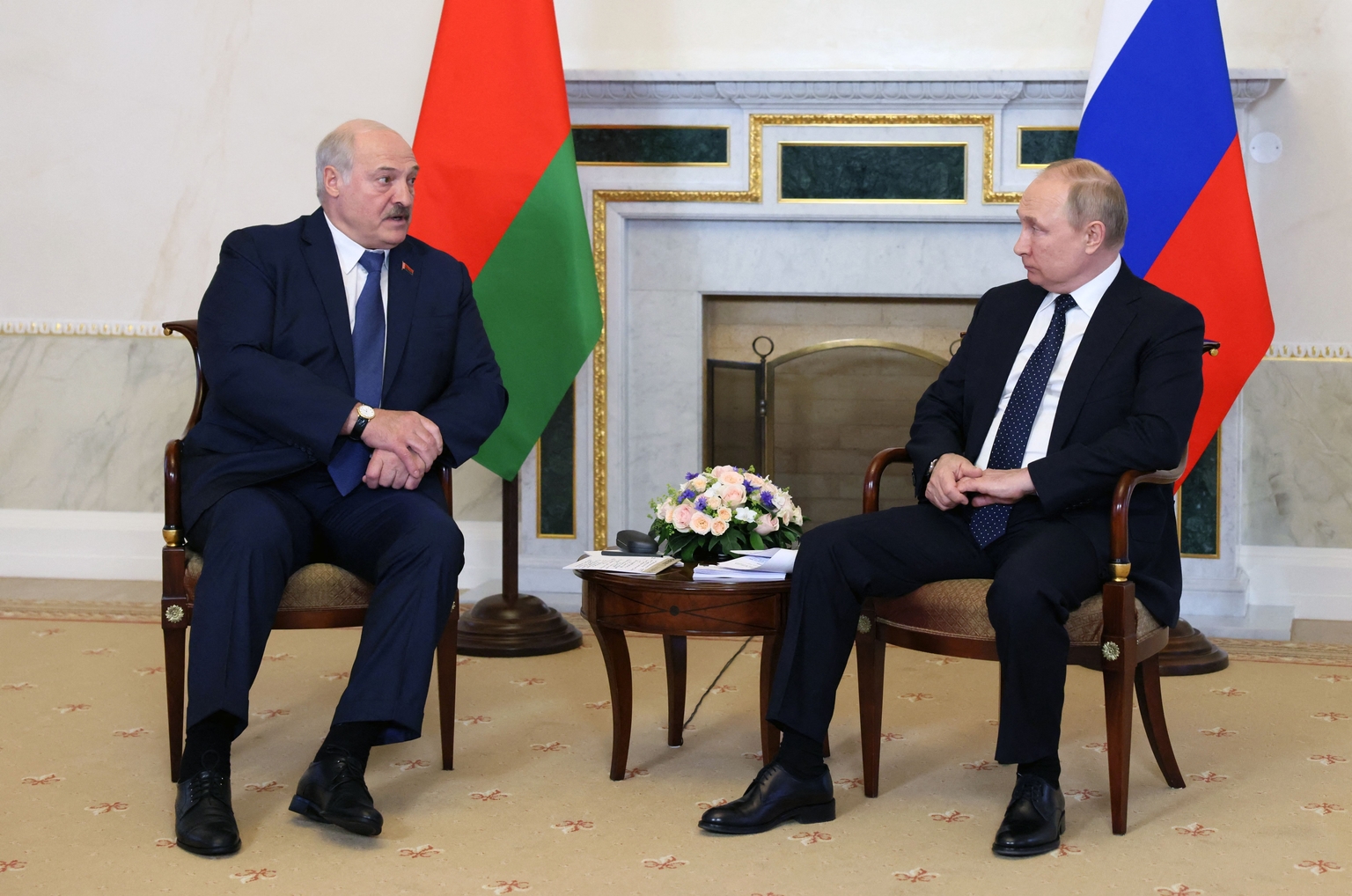
Russian President Vladimir Putin (R) speaks with his Belarusian counterpart Alexander Lukashenko during their meeting in Saint Petersburg, on June 25, 2022. (Getty Images)
Human rights watchdogs report that over 1,000 people have been detained for protesting Russia’s full-scale war against Ukraine. For participating in such protests, 32 criminal cases have been opened.
For example, Belarusian activists attempted to disrupt the transit of Russian supplies and personnel to Ukraine at the beginning of the war. Now, many of those that took part have been prosecuted.
Franak Viacorka, the senior advisor to Sviatlana Tsikhanouskaya, says that Belarus is under the “de-facto double occupation” by Lukashenko’s regime and Russian forces.
Sinking economy
Declining relations with the West and sanctions imposed on Belarus have not gone unnoticed by international financial institutions.
International credit markets, such as the European Bank for Reconstruction and Development, stopped working with Belarus.
Several Belarusian banks have been disconnected from the SWIFT global payments system and the World Trade Organization has denied Belarus’ application to join the organization.
In July 2022, credit rating agency Fitch downgraded Belarus’ Long-Term Foreign-Currency (LTFC) Issuer Default Rating (IDR) to “RD” (restricted default), citing the failure to repay a 2027 Eurobond coupon payment within the 14-day grace period.
The move followed Moody’s statement that Belarus’ actions constitute default, as Belarus failed to fulfill its obligations of $22.9 million. The international rating agency S&P maintained Belarus’ foreign currency rating at “CC/C.”
The country’s once-booming IT sector has been hit the hardest. At its peak, the IT sector comprised 7.5% of Belarus’ GDP. After 2020, many Belarusian IT companies relocated.
As a result of the ongoing economic downturn, unemployment skyrocketed and prices went up. Lukashenko’s regime responded by introducing price regulations on certain “socially significant products.”
Hope?
On Aug. 8, Belarusian opposition gathered in Vilnius, Lithuania, to develop a roadmap toward the country’s potential democratic future and to unite those in opposition to the regime.
Despite the squashing of the uprisings in 2020 and the ongoing persecution of political opposition and activists, many believe that the Belarusian people’s resistance did not end in vain.
Belarusian held rallies around the world on Aug. 9 to commemorate the protests in 2020 and to condemn Lukashenko’s fraudulent electoral win.
“We are Belarusians, we are here, and we keep demanding change,” Sviatlana Tsikhanouskaya declared on Aug. 8.

